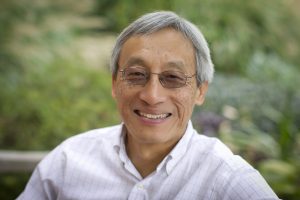
University of North Carolina Lineberger Comprehensive Cancer Center researchers have found a promising strategy that may limit the growth of pancreatic cancers in patients with a mutation in a gene called KRAS.
More than 95 percent of pancreatic cancers have KRAS mutations, and there’s strong evidence that blocking the gene’s function could be a very effective approach to treating pancreatic cancer, said Channing Der, PhD, a UNC Lineberger member and a Kenan Distinguished Professor in the Department of Pharmacology at the UNC School of Medicine. Der and his collaborators believe they have found a strategy that pancreatic cancer cells will have more difficulty developing resistance to.
The key to their findings, which were published in the journal Cancer Cell, involves targeting the last of a series of signals that drive abnormal growth of cells with KRAS mutations. In preclinical studies, scientists led by Der tested an investigational drug that blocks a signaling protein called ERK. A pathway that includes the signaling protein ERK, called the RAF-MEK-ERK pathway, is widely regarded to be key for regulating cell growth and becomes aberrantly activated in cancers with Kras mutations, such as those of the pancreas, Der said.
Although drugs are already on the market that target other signals in this pathway, they have proven ineffective in pancreatic ductal adenocarcinoma. The researchers believe their findings pave the way for clinical trials to test ERK inhibitors as a promising new treatment approach that will be more effective. A Phase I clinical trial led out of Washington University at St. Louis, trial No. NCT02608229, is planned to evaluate one of the ERK inhibitors in pancreatic cancer patients. Der said there are ongoing discussions to start trials at UNC.
“Inhibitors of other steps of this pathway have disappointingly not worked in RAS-mutant cancers because the pathway is so critical for cancer cells that they find a way to reactivate it, by reactivating ERK,” Der said. “We investigated inhibitors directly targeting ERK the last step in this pathway, in the hope that the cancer cell would have more difficulty overcoming that block.”
Nearly 50 percent of the human pancreatic cancer cell lines that they tested responded to the ERK inhibitor. And in animal models of Kras-mutant pancreatic ductal adenocarcinoma, they found that the drug had a significant effect on tumor growth, causing them to shrink or impairing their progress.
“When we surveyed a large panel of pancreatic cancer cell lines, about 50 percent of them were responsive to the inhibitor, and about 50 percent of them were not responsive,” Der said. “That prompted two broad questions for those that responded: First of all, why did they respond, and secondly, did they acquire resistance over time?”
Researchers do expect that even cancer that is initially responsive to the treatment will develop resistance, Der said. So they also studied the mechanism of why certain tumors responded in the hopes of being able to improve long-term responses. They found that a long-term response to the inhibitor required the degradation of a certain protein called MYC. And they also tested the investigational inhibitor in combination with targeted treatments and chemotherapy drugs.
“We don’t think that an ERK inhibitor is just the miracle drug and we’re done. We believe these cancers will figure out a way to develop resistance,” Der said. “And we believe that while these ERK inhibitors may be better than existing drugs targeting this pathway in this particular cancer, to really activate a successful long-term response in the patient, we’re going to have to identify another inhibitor that will work in combination with the ERK inhibitor to overcome resistance. Our guess now is that an inhibitor capable of degrading MYC might do the trick, but we’re still looking for the best drug combinations.”
Authors and Disclosures
The study was supported by grants from the National Institutes of Health, the Lustgarten Pancreatic Cancer Foundation, and the Pancreatic Cancer Action Network-AACR, and a National Cancer Institute fellowship.
In addition to Der, other study authors include: Tikvah K. Hayes of UNC Lineberger and the UNC Curriculum in Genetics and Molecular Biology; Nicole F. Neel, Kirsten L. Bryant, Raoud Marayati, Swapnil Kher, and Samuel D. George of UNC Lineberger; Chaoxin Hu and Anirban Maitra of the Departments of Pathology and Translational Molecular Pathology at the University of Texas MD Anderson Cancer Center; Prson Gautam and Krister Wennerberg of the Institute for Molecular Medicine Finland; Melissa Chenard and Brian Long of the Merck Research Laboratories; Meraj Aziz, Michelle Kassner and Hongwei H. Yin of the Departments of Cancer and Cell Biology at the Translational Genomics Research Institute in Phoenix; Mariaelena Pierobon and Emanuel F. Petricoin III of the Center for Applied Proteomics and Molecular Medicine at George Mason University and the Virginia Commonwealth University School of Engineering Department of Computer Science; Mai Xu and Andrea Wang-Gillam of the Washington University School of Medicine Division of Hematology and Oncology and of the Washington University School of Medicine Division of Medical Oncology; Ahmed A. Samatar of the Merck Research Laboratories and of TheraMet Biosciences; Barry Nelkin of the Johns Hopkins University School of Medicine Department of Oncology; Adrienne D. Cox of UNC Lineberger, the UNC Curriculum in Genetics and Molecular Biology and the UNC School of Medicine Department of Pharmacology and Radiation Oncology; and Jen Jen Yeh of UNC Lineberger and the UNC School of Medicine Departments of Surgery and Pharmacology.
